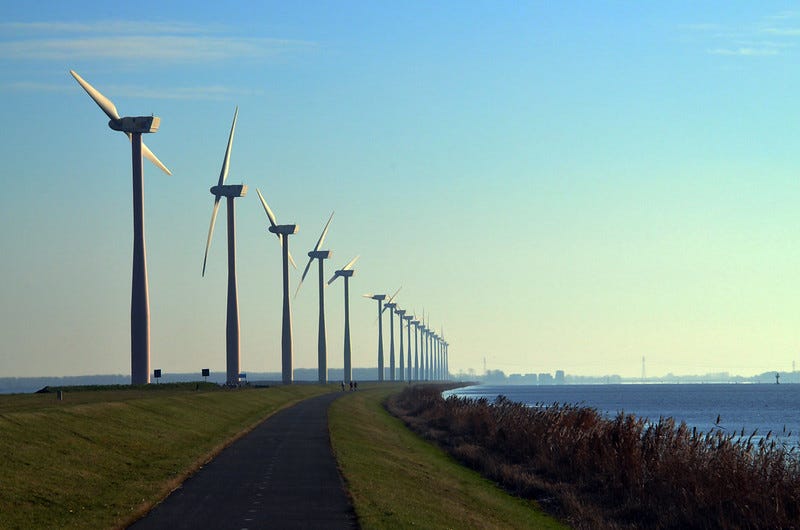Fed's Powell clarifies climate group exit, denies politics as Trump attacks
Welcome to Callaway Climate Insights, your leading guide to global analysis and the climate finance industry.
Today’s edition of Callaway Climate Insights is free for all our readers. We really want to bring you the best and latest in climate finance from around the world. Please subscribe now.

Federal Reserve chief Jerome Powell did his best this week to distance the central bank from the tsunami of politics overwhelming Washington, D.C. with the new Trump administration, but the more he denied it the more he sounded like the bank was falling in line.
Every climate investor knows that lower interest rates are the key driver for green entrepreneurs as they seek to raise money for their young companies, and the past few years of high rates have been tough, as we’ve seen from the market. Now, after a short period of reductions that saw a rally in renewable energy stocks, the Fed is on hold again, a move that drew President Donald Trump’s immediate condemnation Wednesday.
While defending the Fed’s independent policy practices and denying politics played a role, Powell was asked in a press conference about the Fed’s recent withdrawal from the Network of Central Banks and Supervisors for Greening the Financial System (NGFS). He said the Fed had joined the group a few years ago to learn more about what other central banks were doing to mitigate climate risk to the financial system.
But the group’s work had since “broadened” beyond risk to other environmental priorities such as nature and biodiversity, which were “way beyond any plausible mandate you could attribute to the Fed.”
“It was really not driven by politics. It was really driven by the work the NGFS is doing not being the mandate of the Fed,” Powell said.
So far so good, until Trump blasted Powell later that day for not cutting rates again, which is generally good for Trump’s favorite performance barometer, the stock market. He said if the Fed had “spent less time on DEI, gender ideology, green energy and fake climate change,” then inflation would never have been a problem.
So it looks to us like Powell and Trump are finally on the same page. Now, about those egg prices?
Don’t forget to contact me directly if you have suggestions or ideas at dcallaway@callawayclimateinsights.com.
Follow us . . . .
Twitter | LinkedIn | Facebook | Instagram
Thursday’s subscriber insights

ESG funds see revival in Europe as U.S. investors distance themselves
. . . . A retreat from environmental, social and governance funds among U.S. investors after President Donald Trump was re-elected in November was ignored in Europe in the fourth quarter, where sustainable fund inflows more than doubled over the third quarter, according to the latest data from Morningstar.
Investor inflows into European sustainable funds rose to $18.5 billion in Europe last quarter, sparked in part by a rally in global markets and also a rally in carbon prices and natural gas. The gains contrasted to outflows of $4.3 billion in sustainable funds in the U.S. — even while renewable stocks rose — as investors prepared for the anti-climate policies of the new Trump administration.
Investors also bid European carbon prices up about 23% as natural gas rose 25% in the quarter ahead of the colder winter months, according to KraneShares. Carbon traders have had a busy month or two adjusting to the new reality of the Trump administration, and also the impact of the California wildfires.
One of the more interesting developments among carbon investors — and anyone hoping to someday see a global carbon tax to help lower emissions — is that incoming U.S. Treasury Secretary Scott Bessent called a carbon tariff an interesting idea during his confirmation hearing last week. Bessent mentioned the carbon tax could be part of the new Trump series of tariffs, though he didn’t elaborate.
Perhaps European investors see the potential for more sustainable deals there as Trump slashes spending on former President Joe Biden’s Inflation Reduction Act, which had lured away spending on European renewable deals in favor of the more subsidized American ones under Biden.
In any event, the numbers are a significant boost to companies in Europe hoping to raise sustainable funds this year despite a more challenging environment for new climate regulations in Brussels as well as Washington D.C.
Editor’s picks: Trump’s early executive orders
Watch the video: President Donald Trump’s first days in office included a flurry of executive orders with implications for Earth’s climate and environment. AP video: Mary Conlon and Thomas Machowicz. Produced by Teresa de Miguel.
Trump’s early orders on crude and refined products
President Trump, in his first days in office, promised to rescind any Joe Biden-era policies that do not align with the new administration’s policy for Alaska. He specifically rescinded a series of orders and environmental impact statements that temporarily halted lease activities and canceled previously scheduled lease sales, says S&P Global Commodity Insights. The president also revoked a Biden administration memo from 2023 protecting 16 million acres of offshore and onshore acreage, including permanently withdrawing 2.8 million acres of the Alaskan Beaufort Sea north of the National Petroleum Reserve-Alaska as off-limits for future oil and gas leasing. Trump also revoked two orders issued by the previous administration earlier this month restricting oil and gas drilling across 625 million acres of U.S. coastal waters. Biden had issued the presidential memoranda to protect all waters off the east and west coasts of the U.S., as well as the eastern Gulf of Mexico and portions of the Northern Bering Sea in Alaska, from all future oil and gas leasing. This will likely be contested in court, as multiple policy analysts believe it may require congressional action, according to S&P Global.
Latest findings: New research, studies and projects
CCS can be good for a firm’s value
This paper, titled Corporate Climate Change Mitigation, investigates corporate-driven decarbonization through carbon capture and storage, or CCS. CCS entails capturing CO₂ from the atmosphere or an emitting source and has considerable potential to reduce greenhouse gases (GHG). Given its potential to combat climate change, the authors look at the innovation and development of CCS in the U.S. from 2000-2023. From the abstract: “We document that the industry structure matters for CCS. We also determine that due to high costs, investment in CCS has been sluggish; however, recent regulation on the 45Q incentives has channeled corporate funds to CCS. Finally, CCS has been effective in reducing emissions and has a positive impact on firm value.” Authors: Zenu Sharma, St John’s University, Rensselaer Polytechnic Institute; Bill B. Francis, Rensselaer Polytechnic Institute, Lally School of Management.
More of the latest research:
Words to live by . . . .
“I think it’s not about hope, it’s not about optimism. Hope is very beautiful, and optimism is also interesting. But… It’s about wanting to live.” — Eliane Brum, Brazilian journalist and climate activist.




Hey Al......how's it going? Hope all is well.....
Its very clear that the days are numbered for NetZero, ESG and all the other prosperity killers.
Looks like continually foolish EU and the brain-dead UK will be the holdouts from reality.